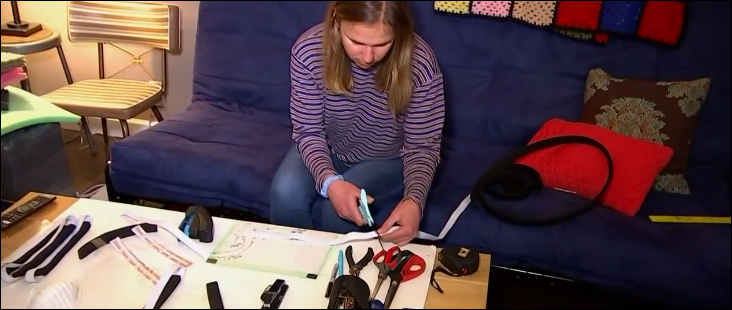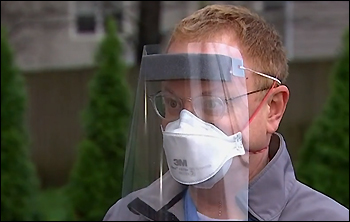
When Vanderbilt University Medical Center resident Ashley Nassiri asked Katy Riojas how to get the School of Engineering involved in the coronavirus crisis, Riojas had an idea.
“Vanderbilt is unique in that engineering faculty and students and clinicians are very intertwined and there’s a lot of feedback in both directions, which makes innovation really fun,” said Riojas, a mechanical engineering Ph.D. student.
One of the biggest things hospital workers say they need are PPEs, or personal protective equipment. “That includes gloves, that includes face shields, that includes masks,” said Dr. Robert Labadie, an otolaryngologist and professor of biomedical engineering.
Katy started thinking about face shields and she found something from the University of Wisconsin. After getting a thumbs up on Saturday, March 21 to start the project, the supplies started coming in among three different households and the process to make shields began.

The shields are simple: adhesive foam weather stripping, transparency sheets or binder covers, and elastic bands. “You can put this shield on when you’re intubating someone or you’re trying to do something that involves secretions. Clean out their nose, clean out their mouth so you don’t get those secretions on you,” said Labadie.
And, Katy has help making the shields. Others like Dr. Duke Herrell, a urology surgeon and professor of biomedical engineering, and his kids are helping. Both Labadie and Herrell help gather the supplies to put the shields together.
So far, at least 300 have been assembled and the hope is they’ll put together about 3,500 as soon as possible. This PPE is one among many that are starting to dwindle in most health care facilities. “Basically, it’s a global shortage so health care facilities need thousands more of everything. If we can do anything to try and combat that, we will.”
Physicians and other staff who need the shields are still wearing N95 masks under as well because the more protection the better. “If health care providers get sick, there are not going to be enough providers to take care of patients and that’s really dangerous,” said Labadie.
“I’ve been a physician for 20 years in Nashville and this is the scaredest I’ve been, the scaredest my colleagues have been and I don’t think that we’re being alarmists, I think we’re being realists. If we can keep people healthy, not transmitting the virus, then I think we can get through it but only time will tell,” Labadie said.
At this time, neither the engineering students making the masks or health care workers are asking for the public’s help in the effort. They still say the best way to help is stay home and help “flatten the curve” of the spread.
Source: Kyle Cooke, WSMV Nashville
Contact: Brenda Ellis, 615 343-6314
brenda.ellis@vanderbilt.edu